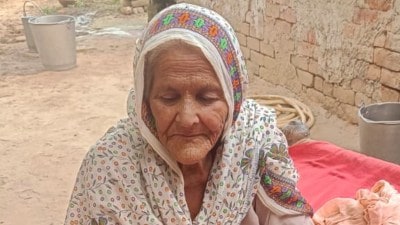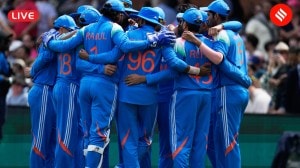‘He said I will take you to Sonia, get your son a govt job’
The seven men are traumatised, even scared to step out of their homes. All have a harrowing story to tell, of ‘‘false inducements&...

The seven men are traumatised, even scared to step out of their homes. All have a harrowing story to tell, of ‘‘false inducements’’ by a local Congress activist, solitary confinement and detention in New Delhi and Udhampur for months before being lined up for an official surrender ceremony by the Army on November 9.
Yesterday, The Indian Express reported how 27 of the 47 ‘‘militants’’ shown as surrendering in Nagrota were, in fact, desperate unemployed men. While J&K Director General of Police Gopal Sharma confirmed that they were ‘‘not genuine militants, not eligible for surrender,’’ the Army says a ‘‘civilian source’’ got them the terrorists and then absconded.
Today, The Indian Express travelled to six villages in Chrar-e-Sharief to track down some of these men.
• Abdul Rehman Ganai, 60, Lolipora
A grandfather, Ganai has hardly stepped out of his house since his return on November 21. ‘‘You can see how poor we are,’’ he says. ‘‘I was building a case for a self-employment loan for my son when I met Bashir (Bashir Ahmad Golu), who is a Congress activist. He told me we (Congress) are in power now and I will take you to Delhi to meet Sonia Gandhi and get your son a government job.’’
On June 5, Ganai said, he and seven other men from his village, were driven by Golu to Srinagar and then to Delhi where they were put up in a building near the airport and ‘‘treated very well.’’ Golu also introduced them to Nazir Ahmad Bhat, a relative of Peerzada Mohammad Sayeed (Pradesh Congress President).
The next morning, Golu came with two armed guards and a man who was introduced as a Brigadier.
They were given new names for ‘‘security reasons,’’ Army uniforms and jungle boots and driven to two ‘‘video coaches.’’ When he didn’t return from Delhi, Ganai’s brother, Ghulam Nabi, also the village chowkidar, filed a missing person case with the Chrar-e-Sharief Police Station.
Golu is currently in police custody.
|
‘I wasn’t PCC chief
when this happened’ |
|||||
|
J&K Congress president Peerzada Mohammad Sayeed: Col R K Sen, PRO, Northern Command: |
|||||
• Abdul Rasheed Wani, 40, Nilnag.
A father of two daughters, Wani was part of Ganai’s group taken to Delhi. Golu’s line was the same: a meeting with Sonia and a government job. When he was asked to board the ‘‘video coach,’’ there were seven Kashmiri men inside. ‘‘An Army officer told us we were heading back home and asked us not to talk to each other. At 9.30 am, we reached Udhampur Army camp. The Army played a band and we were treated very well. Next morning, an officer warned us not to try to talk to anybody. We were given a volleyball to play. We didn’t know why the Army was doing all this to us.’’
• Abdul Majid Wagay, Age: 33, Village: Lolipora.
Wagay is married with four children and his story too begins with Golu. ‘‘We were lucky to have returned home alive,’’ he says. ‘‘They dubbed us militants, they could have killed us as well.’’
What happened at Udhampur army camp? Wagay says they were kept there until November 9. ‘‘It was scary. We didn’t know what to expect next…The Army had kept a man with us, like a shadow. He kept warning us that if we didn’t cooperate, coffins are ready for us in the adjoining building.’’
Back home, Wagay’s wife borrowed Rs 20,000 from a neighbour after mortgaging their land and travelled to Kotbalwal Joint Interrogation Centre to look for her missing husband.
• Mohammad Iqbal Mir, 30, Batagund
Unable to make ends meet, this carpet-weaver wanted a government job. He was given an alias of Sher Khan. ‘‘On August 16, we were taken to a place where we saw Nazir (Nazir Ahmad Bhat) and Bashir (Bashir Ahmad Golu). We were told to forget the past and never mention that we were going to Delhi to meet Sonia Gandhi.’’
‘‘For the first time, we were told to pose as militants and take part in a surrender ceremony. I was told to say that I crossed over to Kashmir in 1995 via Rajouri and was an active militant. That I was now fed up and wanted to return home. We listened because this seemed to be the only way to get back home.’’
• Farooq Ahmad Baba, 33, Batapora
Local Congress leader, he knew Golu well and agreed to travel to Delhi. He was promised a government job and, what seemed more exciting, a meeting with Sonia Gandhi.
‘‘I was scared. Every time there was a knock on the door, I thought they had come to take us away. I couldn’t understand why they wanted us to fake as militants and surrender.’’
‘‘We were told to wear uniforms while being taken out of the compound. Every morning they would come and take us for drills. On November 2, we were taken to a ground and lined up before a pile of weapons. They took our photographs.’’
• Nazir Ahmad, 34, Hafru
Leaving his ailing mother, Ahmad joined the delegation in the hope that he would return with a permanent job. ‘‘I worried for my family. It was a nightmare. Though we are back home, we live in fear. We are sitting ducks. Anybody can come and kill us. Our only mistake is that we are jobless and poor.’’
• Manzoor Ahmad Hafiz, 26, Hafru.
A labourer, he was lured by Golu with the promise of a job. ‘‘I feel as if I was in jail. On November 9 morning, we were told to wear uniforms. We were lined up and told to repeat the story about being militants. At around 8 am, we were put in two Army trucks and taken to a camp. They said this is Nagrota.’’
‘‘We were searched at the entrance and served tea and cigarettes. Here we saw another group, brought from Doda. We were told to put on masks for the surrender…Nobody asked us questions. We were taken back to Udhampur in the evening. We were scared but nothing happened. On November 15, we were put in Army buses. An officer accompanied us and we were taken to a camp at the old airport in Srinagar. A few days later, we were handed over to Budgam police. We were happy to be back. We narrated the entire story to the police. They sent us home.’’





- 01
- 02
- 03
- 04
- 05


























